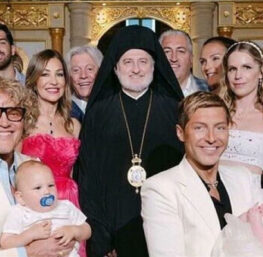 by Bruce Bawer –
by Bruce Bawer –
The lights are going out all over Europe. The Christmas tree lights, that is. Not all of them all at once, mind you, but one at a time – one here, one there, one Christmas season after another.
Just the other day, for example, came the news about a co-op apartment building in Kokkedal, Denmark.
Not long ago, the co-op, which has a considerable number of Muslim residents, spent 60,000 kroner (about $10,000) to celebrate the holiday of Eid. Three days afterwards, however, when the co-op board, consisting of five Muslims and four unbelievers, got together to decide whether to spend approximately 5000 kroner on a Christmas tree – a tradition in the building – they voted the proposition down. Although a “private donor” later stepped in to pay for a tree, the news of the co-op board’s decision had meantime made the national news, drawing two journalists from Denmark’s TV2 who, after making their way to Kokkedal last weekend to investigate the story, found themselves under attack by a couple of dozen masked individuals who threw bricks and cobblestones at their van and called them “neo-Nazis.”
The tidings from Kokkedal were unpleasant enough. But then came the news that the traditional Christmas tree in the Grote Markt (Market Square) in Brussels has now also become a thing of the past. In interviews with the media, Brussels councilwoman Bianca Debaets expressed her suspicions that municipal authorities had put the kibosh on the tree for religious reasons. (Brussels, it should be noted, is at present 25% Muslim. And climbing.)
At first, Brussels city officials vehemently denied that the decision to banish the Christmas tree in the Grote Markt had any religious basis. Perish the thought! Instead, they sought to convey the message that Christmas trees are old-fashioned – yesterday’s news. And they made a strenuous effort to stir up public excitement over the fact that, instead of a tiresome old traditional tree, the Grote Markt will be the site of a cool, hip, up-to-date “light sculpture” that will suggest the shape of a tree, but that, instead of branches and needles and such, will be composed of strobe lights and other high-tech electronic paraphernalia.
It will, in short, be a trendy, twenty-first-century celebration of – well, nothing in particular, exactly. Certainly not Christmas. One thing that was made perfectly clear to the Belgian populace was that this newfangled installation would not allude in any way, shape, or form to the Christian holiday, but would instead be characterized as a “winter” decoration. Indeed, the Brussels city government took the trouble to issue a directive ordering that accounts of the new downtown “sculpture” should not include any reference to Christmas.
One news report described this postmodernist artifact as follows: “The electronic sculpture will stand 25 meters (82 feet) tall and consists of a set of television screens.” Another noted: “During the daytime you can climb to the top of the tree where you will be able to enjoy a panoramic view of the city.” And: “As soon as it becomes dark the tree turns into a spectacle of light and sound. Every ten minutes an amazing show will unfold.”
Debaets, for one, was not terribly impressed by this dubious step into the brave new Eurabian world. But the change had been made, and there was apparently no widespread movement to resist it. In any case, as the spokesman for the mayor of Brussels was eager to assure everyone, the switch to a treeless display had nothing whatsoever to do with any faith.
As it turned out, that was a lie. It soon emerged that the city fathers had relegated the tree to the history books for one reason and one reason alone – namely, that “the local Muslim population found it ‘offensive.’”
Now, it doesn’t matter whether you, as an individual, care for Christmas trees or consider them a big deal. That’s not the point. The point is that when you give way on one not-such-a-big-deal thing after another, it eventually does become a very big deal indeed. Step by step, one culture gives way to another – all the while telling itself that it isn’t doing anything of the kind.
The question here is this: at exactly what point do intelligent, self-respecting Westerners rebel against the ubiquitous concept of Islamic “offense” – especially when it concerns things that are at the very heart of the Westerners’ own culture and history, if not their own deepest beliefs? At what point do Westerners balk at the fact that “offense” has become a one-way-street, with Muslim “offense” at various aspects of Western culture being treated as sacrosanct while Westerners, if they so much as hint at being offended by any aspect of Muslim culture, are branded as racists and Islamophobes?
At what point do Westerners refuse to whittle away at their own cultures and customs in order to please, placate, and pacify? At what point do they take a good, hard look at reality – at the fact that while they may experience a warm, fuzzy feeling at the spectacle of their Muslim neighbors celebrating Muslim holidays, a great many of those Muslim neighbors are determined to eradicate any outward sign of their religious holidays – and realize that something is going very, very wrong?
What a grim mystery the psychology of dhimmitude is! How staggering it is that so many people in the Western world are so willing to allow the furniture of their lives to be rearranged in response to claims of offense founded on some alien culture’s ingrained triumphalism!
When will it stop? For it must stop. For if it doesn’t stop, it’s clear as day where it will all end.
HT: FrontPageMag



